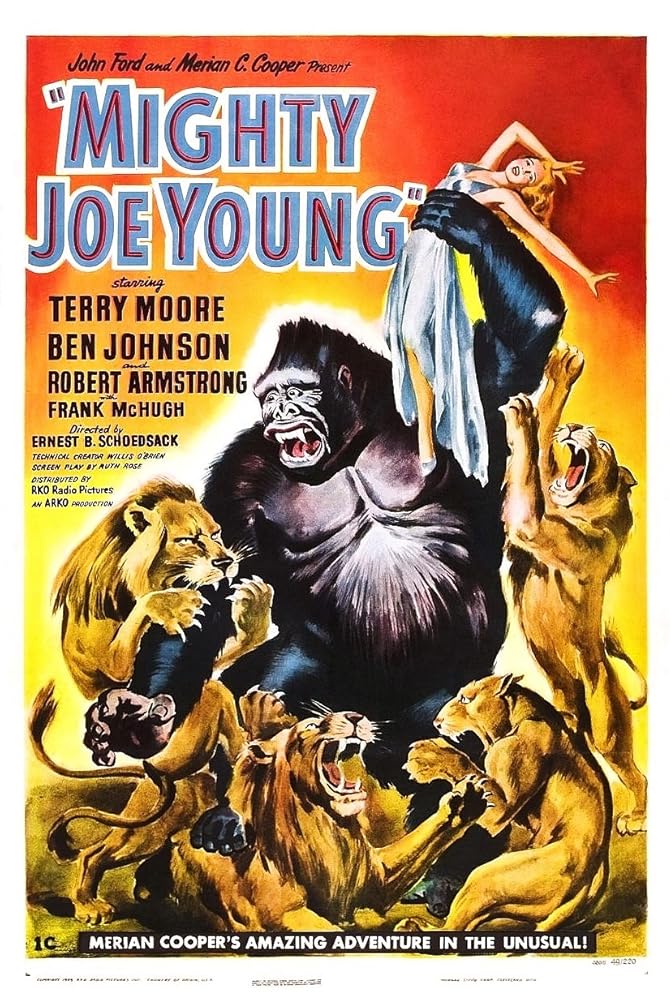
MIGHTY JOE YOUNG
(director: Ernest B. Schoedsack; screenwriters: from the story by Merian Cooper/Ruth Rose; cinematographer: Roy Hunt; editor: Ted Cheesman; music: Roy Webb; cast: Terry Moore (Jill Young), Lora Lee Michel (Jill as a girl), Ben Johnson (Gregg Johnson ), Robert Armstrong (Max O’Hara), Frank McHugh (Windy), Douglas Fowley (Jones), Denis Green (Crawford), Paul Guilfoyle (Smith), Nestor Paiva (Brown), Regis Toomey (John Young); Runtime: 94; MPAA Rating: NR; producers: Merian C. Cooper/John Ford; RKO Pictures; 1949)
“Though in the shadows of Kong it still brings back fond memories of how to make a special effect film back in the old days.”
Reviewed by Dennis Schwartz
A sequel to King Kong of 1933 by the same production team of director Ernest B. Schoedsack, writer and producer Merian Cooper, writer Ruth Rose and special effects wizard Willis O’Brien–with Ray Harryhausen by his side to help with the animations. Schoedsack’s final film he directed didn’t fare as well as King Kong critically, but the whimsical film had some staying power and though in the shadows of Kong it still brings back fond memories of how to make a special effect film back in the old days. It won an Oscar for special effects. The script handed in by Rose from Cooper’s story is strictly cornball, but the story is pleasing for kids and the film is well-made.
Warning: spoiler to follow in next paragraph.
It opens in Darkest Africa, where little Jill Young (Lora Lee Michel) lives on a farm with her widowed father (Regis Toomey). She trades her father’s flashlight for a baby gorilla with two natives, and her father keeps it thinking the lonely girl needs someone to play with despite thinking it’s not a good idea in the long run. The gorilla is named Joe and bonds with Jill. The film then cuts to twelve years later and Jill (Terry Moore) now a teenager runs the farm alone since her father died six months ago. The gorilla has grown to ten-feet-tall and weighs around 800 pounds, and no longer lives in the house but in the jungle. New York sharpie showbiz entrepreneur Max O’Hara, played by Robert Armstrong reprising the same role he had in King King, comes to Africa with rodeo cowboy roper Greg Johnson (Ben Johnson) and crew to bring back animals for a new and unusual nightclub he’s opening in Hollywood called the Golden Safari. While in Africa Max feeds his PR man Windy (Frank McHugh) far-fetched stories that work to create interest for the new club. WhenJoe invadesMax’s campsite and is about to mangle Max, Jill comes along and sweet talks the gorilla into gently putting Max down. Max insists on bringing Jill and Joe to Hollywood to feature Joe as a main attraction, and the surprise act has Jill sitting in an evening gown by a grand piano playing “Beautiful Dreamer” and Joe lifting the orchestra pit part where she’s playing to make his grand entrance to oohs and aahs from the startled audience as he carries Jill on his shoulders (which is the film’s centerpiece magical moment and enough of a reason to see the film). The kitsch nightclub review features such novelty acts as voodoo dancers and ten famous strongmen, including boxer champ Primo Carnera, in a tug-of-war with Joe. Jill saddens when she notices that Joe doesn’t like living in a cage and that she prefers the quiet night life in Africa to the loose-living life in Tinseltown, but Max tricks her into staying on until he gets a replacement. Three obnoxious drunks go backstage and upset Joe by taunting him with a bottle, but as Joe is already pissed off from a prior abusive audience that threw things at him he now goes ape and busts free from his cage to destroy the nightclub. The police bag him and the judge orders him shot, but Joe escapes only to go into a burning building and rescue a bunch of orphans. The order to shoot Joe is rescinded and a happy ending results, as Jill marries Greg and they are back on the farm in good ole Africa with the housebroken and de-mythologized Joe by their side.
REVIEWED ON 7/25/2005 GRADE: B-